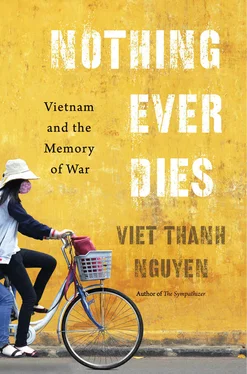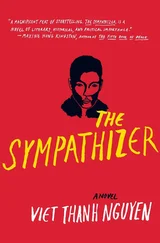It is unethical and unjust to refuse to acknowledge these inequalities in the matters of death and damage, but it is difficult to confront or acknowledge inequalities when the memories of these events are themselves unequal. Exposed only to their own memories, Americans who come across the rememories of others often react with fury, denial, and countercharge. In this, they are not unique. Every nation’s people are accustomed to their own memories and will react the same way when confronted with other people’s rememories. People protect and justify themselves, and their memories cast themselves in the best possible light. Negative memories are not necessarily forbidden but they are, however, negotiated. Americans may dimly know that some of their soldiers committed terrible acts, but such actions are mitigated by the circumstances that supposedly forced the soldiers into wrongdoing and by the American capacity for honest reflection. Americans may commit crimes, but they do not commit propaganda, or so they believe. No matter what form propaganda takes, it always belongs to someone else, which is not to say that all propaganda is the same. The American version is several grades better than the Vietnamese one, partially because American propaganda is not state-controlled. The industry of memory and the war machine work together, most of the time, to both acknowledge and justify America’s mistakes and crimes. The Soviets and the Chinese, for all their authoritarian power and massive war machines, were never as good at packaging their ideology, which came in a one-size-fits-all mode of drab fashion and bad haircuts. Communism’s message says to do as the party and the people tell you, while capitalism tells you to do whatever you want, its ideology ready to wear in any size. Everyone can agree to disagree, even if, in the last instance, this may be false. Sometimes the limits to the American belief in “freedom” are nakedly visible, as during McCarthyism, but mostly the limits are visible only out of the corner of one’s eye. These limits are found in the requirement to pay one’s taxes to fund the war machine and to concede that armed resistance against the war machine is futile.
A key part of American ideology is that all individuals are equal, even if American practice demonstrates that such is not the case, including in the realm of memory. Collective memories are not equal and individual memories are only equal so long as they remain segregated within one’s own mind. My memories feel as powerful to me as yours feel to you, regardless of any differences in our places in the world, but if you have access to the megaphones of industrial memory, your memories are more powerful than mine. So it is for Americans and Vietnamese, their memories equally meaningful to each of them but unequal on the global stage. Worldly memory is neither democratic nor fair. Instead, various kinds of power, none of which can be separated from each other, determine memory’s influence, reach, and quality. American power means that America can project its memories elsewhere, in the same way that it projects military force to render the lives of others less valuable than American lives. The empire of bases of which the scholar Chalmers Johnson speaks, some seven or eight hundred American military outposts, encampments, airfields, and black sites found all over the world, manifests this power. 24And just as many countries let themselves become territories where American soldiers can operate, even more countries have let down their defenses against the intrusion of American memory, the soft power exports of cinema, literature, language, ideas, values, commodities, and lifestyles, the whole Hollywood — Coca Cola — McDonald’s network found in many big cities and not a few small ones, including in Vietnam, from its metropolitan centers to its new suburbs with their smooth sidewalks, fast food outlets, and detached single family homes.
Because of the reach of American military and mnemonic power, of the entire American war machine lifestyle and its assumptions, I always run into American memories. No matter where I go outside of Vietnam, if I want to discuss the war, even with intellectuals and academics, I often have to encounter their encounters with American memories. The Ivy League professor of contemporary literature who inquired about Tim O’Brien at my lecture on Vietnamese civilian war memories (because, she asked, what about actual war stories?); the Indian professor of Indian cinema who brought up Apocalypse Now when I mentioned Vietnamese cinema about the war; the young Vietnamese filmmaker training at my university who volunteered that he admires Apocalypse Now . How I would hate Apocalypse Now except for the fact that it is a damn fine movie, besides being the perfect example of the war machine’s industrial memory. The Indian professor even quoted from Francis Ford Coppola about the legendary making of the movie: “My film is not a movie. My film is not about Vietnam. It is Vietnam. It’s what it was really like. It was crazy. We made it very much like the way the Americans were in Vietnam. We were in the jungle. There were too many of us. We had access to too much money, too much equipment, and little by little, we went insane.” 25I can excuse Coppola for the sentiments. He was young, perhaps megalomaniacal, and certainly caught up in the creative struggle of his life. But was he fundamentally wrong? Jean Baudrillard took him at his word, saying that “Coppola makes his film like the Americans made war — in this sense, it is the best possible testimonial — with the same immoderation, the same excess of means, the same monstrous candor … and the same success.” 26 Apocalypse Now , nearly a disaster in its making but a box office triumph and a cinematic classic, can be read as an allegory for the fate of America’s ambitions in Vietnam: short-term failure during the war but long-term success in containing communism in Southeast Asia.
Movies and wars are related, and the American helicopter symbolizes this relationship. Michael Herr, who also wrote the narration for Apocalypse Now , had this to say of those American helicopters known as Loaches: “It was incredible, those little ships were the most beautiful things flying in Vietnam (you had to stop once in a while to admire the machinery), they just hung there above those bunkers like wasps outside a nest. ‘That’s sex,’ the captain said. ‘That’s pure sex.’ ” 27Loaches appear in Apocalypse Now , too, a movie that is, cinematically and mnemonically, pure sex, and is unsettling for some as a result. Apocalypse Now and Herr’s Dispatches converge in their honesty about, or perhaps exploitation of, the nitty-gritty core of war, which is the fusion and confusion of lust and killing, sex and death, murder and machinery, resulting in homicides that were illegal at home but encouraged overseas in the war zone. For men and boys of a certain persuasion, “pure sex” is life and death, the mind-blanking climax that eradicates the self and may yet lead to its reproduction. Apocalypse Now depicts the desire for pure sex and conveys the lust to its viewer, the emblematic scene being the helicopter assault on a Viet Cong village, set to the diegetic soundtrack of The Ride of the Valkyries . Director D. W. Griffiths also used this Wagnerian music in his Civil War and Reconstruction era epic The Birth of a Nation , the score accompanying the heroic Ku Klux Klan as they ride to rescue whites besieged by lascivious blacks. Perhaps Coppola was criticizing American culture by comparing American soldiers riding on helicopters to the Ku Klux Klan on their steeds, but the seductive power of his cinematic, airborne assault makes that critique hard to see.
Just as Coppola quoted from Griffiths, the director Sam Raimi would quote from Coppola in Jarhead , the film adaptation of Anthony Swofford’s memoir of the Gulf War. Raimi picks up on the author’s depiction of young men’s erotic infatuation with pure sex and war movies:
Читать дальше












